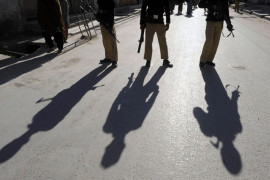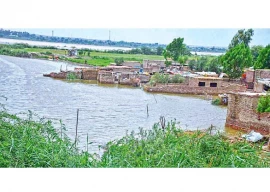
The findings reveal excessive use of the words Hindu, Christian and Jew while discussing the history of Pakistan and Islamic Studies, which portray the said faiths in a negative light.
For example, an Islamic Studies book of Sindh board for class 5, in a chapter on Eid (religious festivals), includes a line saying, “People of other religions usually stay busy in useless activities during their religious festivals. There is no concept of God or submission among them.”
The chapter “Pakistan, an Islamic State” in the same textbook of Punjab board includes this line: “Hindus harmed Muslims in every way.”
The content analysis has been published in Urdu to generate a debate on how the inclusion of discriminatory content in curriculum sows seeds of hatred, and to ensure that the review reaches maximum people.
Number of chapters with biased content
PUNJAB:
Class 1: General Knowledge – 1 out of 30 chapters (3.33%)
Class 5: Pakistan Studies -–1 out of 11 chapters (18%), Urdu – 2 out of 33 chapters (6.06%)
Class 6: History – 2 out of 5 chapters (20%)
Class 7: Pakistan Studies – 1 out of 10 chapters (10%)
Class 8: Urdu – 3 out of 43 chapters (6.9%), Pakistan Studies – 4 out of 13 chapters (30.76%)
Class 9 and 10: Urdu Grammar – 3 out of 9 chapters (33.3%)
Class 9: Pakistan Studies – 3 out of 4 chapters (75%)
Class 10: Urdu compulsory – 1 out of 32 chapters (3.12%), Pak Studies – 3 out of 10 chapters (30%)
Total number of chapters with biased and discriminatory content: 28 out of 204, which make up for 13.7% of the content.
SINDH:
Class 2: Urdu – 1 out of 39 (2.6%)
Class 5: Islamic Studies – 3 out of 4 (75%)
Class 6: Islamic Studies – 1 out of 5 (20%), Urdu – 3 out of 33 (9.09%)
Class 7: Pakistan Studies – 2 out of 9 (22.2%), Islamic Studies – 2 out of 5 (40%)
Class 8: Urdu – 7 out of 40 (17.5%), Pakistan Studies – 1 out of 9 (11.1%)
Class 9 and 10: Urdu – 1 out of 25 (4%), Pakistan Studies – 1 out of 10 (10%)
Total number of chapters with discriminatory content: 22 out of 179, which make up for 12% of the content of curriculum.
Comparison between revised curricula of 2009-11 and 2012-2013
SINDH:
The NCJP analysed that the syllabus being taught at government schools in Sindh includes a higher number of mentions which can be categorised as discriminatory. Number of chapters with discriminatory content in 2009-11 was 11, but in 2012-13 there are 22.
The marked increase is due to the addition of mentioned content in syllabus of Urdu for classes 9, 10, 8, 5, 6. However, the Islamic Studies book of class 7 and Pakistan Studies of class 8 do not include the discriminatory content from the 2009-2011.
PUNJAB:
In Punjab, the number of chapters with discrimination towards minorities has increased from 11 in 2009-11 to 22 in 2012-13.
The analysis shows that in 2009, the number of lines with religious bias was 45 and in 2012 the number is 122. Urdu and Pakistan Studies syllabus for classes 10, 9, 8 and 7 show a marked increase in discriminatory content.
In 2009, Urdu and Pakistan Studies books of the said classes included 15 lines with discrimination towards religious minorities, but in 2012, the number of such lines went up to 86, the NCJP reveals. Islamic Studies and Urdu syllabus include more content with religious bias. The Islamic Studies textbook previously did not include chapters with such content but now have three chapters each.
Recommendations
The content analysis recommends that students should be taught the role of religious minorities in Pakistan’s creation. Religious teachings should ideally be passed on to children at home through families.
In case, it is impossible for the state to exclude Islamic Studies from school curriculum, then the minority children should have a right to religious teachings as well, as per the Article 20 and 22 of Constitution of Pakistan. Therefore, the latter should be allowed to study teachings of their respective faiths instead of ethics.
COMMENTS (55)
Comments are moderated and generally will be posted if they are on-topic and not abusive.
For more information, please see our Comments FAQ
1724657897-0/Untitled-design-(2)1724657897-0-405x300.webp)
















@Salman: In Bihar in place of Sanskrit muslims have option to take Urdu.
The "contents" of the syllabus is in question here. I don't care if a student wants to learn the Zulu language from south Africa. It does not threaten us. the impressionable young minds of the students are getting trained to be intolerant and immune to sensible discussion here which will affect my child's generation next. Languages don't create zombies.cheerio
I am so happy that at last some steps are being taken to eradicate this worng. I must also invite attention of the scholars and authorities that throughout in the schooling tenure a child in Pakistan is taught that we are very brave, pious, people, zinda-dillan-e-Pakistan, etc. Such notions have created no good in the mantalities but a sense to belittle and hatred towards rest of the religions and nations. Let our children be taught both nagatives and positives of our characteristics alike... so that they learn the truth and bring themselves on righteous path.
"'People of other religions busy in useless activities during religious festivals': So say Pakistan's school books" +++++++++++++++++++++++++++++++++++++++++++++++++++++++++++++++++++++ Actually,
'People of other"useless" religions busy in useless activities during religious festivals': So say Pakistan's school books
@allaisa: In Indian Christian schools,Christian students are taught the Bible and Moral Science.Non Christian students are taught only Moral Science.But now where in our syllabus is there any running down of people of other faith
@Salman:
In INDIA minorities are in more quantity thn Pakistan, and still they have been taught not even Hindi only bt in North India most Schools have Sanskrit also in thr syllabus,
Well in India you can study Sanskrit and the reason most people opt for it is to score easy marks. Mind you there is no compulsion on the 3rd language that generally happens to be Sanskrit and it is generally taught only till you are 16 (class X). And the reason they incorporate this language is otherwise children will not be exposed to it. You can ideally even take German, French et al provided your school teaches it or you have some other sources for studying and writing the final exam. There is also Pali language for civils, which is popular, and again the notion is that all literature subjects have to be taught as they are all part of our culture. In retrospect the utility of such languages is generally not very effective. Its like the struggle of east asians in mastering english. All of them are generally taught english these days or atleast the focus is there but ultimately it boils down to marks, standards are lowered to ensure popularity and generally the output is a bag of mixed results. I am glad there are no country specific studies or religion specific studies. To me it points to deep insecurities about both and hence to need to shovel it down throats of unsuspecting kids.
Feeding poison to children. :(
I would like to hear what Imran Khan has to say about this.
@Majid:
In summary, the greatest philosophers the world has seen, Madhva, Ramanuja and Shankara concluded that a stone is worthy of worship? What sort of a sane textbook author believes that?!
@Salman It's not about the language it's about the religion all around the world there is a religious faculty from Harvard to Tampere and students opt to study religion. The point of context it's not the language and religion for all.
I bet you must have scored in 50 marks exam in HSC where one has to write 6 to 10 page essays on various aspects of Islam.
@Salman: Reading your comments made me wonder where have you recieved your education from, because you have completely lost the point the article wants to make. Nowhere they are asking to stop Islamic studies, they are only pointing out the chapters where religious intolerence is promoted through educating young minds things which are not true.
Lesson - Ideology of Pakistan
http://www.ncjppk.org/specimen.pdf
@Salman, your information you are quoting here is old and false and is far from truth. First the German Universities, There are numerous German universities now offering many courses that foreign students may like with English as medium of instruction. So that rationale of yours is gone. In India, Sanskrit is never a compulsory subject in any school of India, it is optional and is often opted for by students in schools because of grammatical structure which gets more marks for students, which helps overall performance in terms of marks in exams. Under criticism is not the language of instruction as Urdu, which is fine, the issue is what is being taught, the quality and content. Lets not lose the focus of debate.
They should amend it to, "People of ALL religions ..." Would make more sense.
Sami,
You are absolutely right. Pakistan has a state religion, no matter how others may try to sugarcoat it or dance around it. It is also following the dictates of that religion. Now, when the effects are being seen, why are people complaining?
In the USA public schools do not have religious courses. But Parochial schools do and you have to attend their religious classes. That is the price you pay for going to a Parochial school. Indian law, I was told is different. Not only the Government schools do not religion but even the so called missionary schools cannot teach religion if they are to be recognized by the Government. Instead they offer moral studies.
So far we have been blaming Zia for the bigotry in text books. This study shows that it has increased in the recent years. So who should be blamed for this now?
When will they upgrade the course content to take care of Ahmedias, Shias, Hazaras, Baloch etc.; now that Hindus and Christians have been taken care off? If you are true Muslim, there is only one God and all other Gods are false, so what is wrong in stating that they do not have a concept of God and submission. This is the Islamic Republic of Pakistan - the land of the pure. Islam is supreme, all other religions must respect that.
Religion should not be taught in public schools. Rather, a course on EMPATHY and ETHICS should be taught.
@Zeeshan:
Sure, shoot the messenger..it is so easy to hide behind theory of conspiracy against Islam...Nobody is saying anything against Islam, it is how you portray Islam is a problem here. Acceptance of a misdeeds and errors goes long way to healing and future corrections Hope you can comprehend that.
Though I may have significant differences with Pakistan and Pakistaniat, I do support this introspection. If Indians offer their critical feedback when someone is introspecting it will only lead to animosity. Even if it is your worst enemy, if they are contemplating their path, at best "shut up". Regards.
And the biased content actually increased in the last few years.
Bigotry against minorities is just so widespread now, thanks to such institutionalized indoctrination.
@Zeeshan. Before commenting, please find out about what that is discriminatery in the school books. If you find that there is no discriminatery evidence, then you discard the findings but if there is evidence then one should try and rectify it.
Shear irresponsible brainwashing.
Conspiracy !! The Famous word .
So, what is this National Commission for Justice and Peace (NCJP)? What gave them the right to be the arbiter? A wikipedia entry said this organization is established by Catholic Bishops. Can Muslims cry foul in Christian nations because of the presence of " Christian bias" without being accused of "Islamization" and "Muslim takeovers"? Does saying Islam and Christianity are equal religions where the followers of these two faiths are heading to heaven considered "discriminatory" toward Hindus and Zoroastrians or these statements are acceptable for NCJP?
Should Muslims start perusing Bible studies just to see anything "discriminatory" and "offensive" toward Muslims and Islam in these textbooks?
Suggest, but don't hector especially when you yourself has hidden agenda behind your commission. Political correctness is not what we should be aiming for.
So, what is this National Commission for Justice and Peace (NCJP)? What gave them the right to be the arbiter? A wikipedia entry said this organization is established by Catholic Bishops. Can Muslims cry foul in Christian nations because of the presence of " Christian bias" without being accused of "Islamization" and "Muslim takeovers"? Does saying Islam and Christianity are equal religions where the followers of these two faiths are heading to heaven considered "discriminatory" toward Hindus and Zoroastrians or these statements are acceptable for NCJP?
Should Muslims start perusing Bible studies just to see anything "discriminatory" and "offensive" toward Muslims and Islam in these textbooks?
Suggest, but don't hector especially when you yourself have hidden agenda behind your commission. Political correctness is not what we should be aiming for.
No one can dare to change a word in school syllabus, religious extremism has become a pride in Pakistan. Whoever points to the rising hatred in the society is labelled as anti-Islamic and anti-Pakistan. Pakistan has got to the point of no return.
What a tragedy....
@Ahmed: yes Ahmed you are right. We are the only pure people left. Come see Ramadan in the Arab countries, no one does sheesha. Everyone is busy reading quran and meditating and praying. And working hard, not taking short hours of work. We are so much better than these other people who have fun - how dare they!
Some people do forget that others too have an opinion about their religious practices
For eg,last month during Ramzan,one of my colleagues sought special permission to leave home at 4:30 pm.Also he used to take a 1 hr break at lunch to go to nearby mosque for afternoon prayers,comes late to office on fridays and mostly importantly,his work level dropped drastically that whole month while he keeps yawning due to lack of sleep and hunger.
But,we dont talk about the fact that they want to get excused for 1 whole month of every yr to follow their tradition,but cant tolerate others who dont take more than a week combined
Your not born a xenophobe -- takes years of indoctrination.
It is pleasant surprise that so many sane comment here today. It give little hope for better future.
I think Islamic Studies should be excluded from the curriculum, instead Ethics should be part of the curriculum in schools and in high schools as well. in a school level teachers told students there is a big figth between india and Pakistan and tht country is our enemy so children take it personaly or teacher think we are making them patriotic . but thy not explain the social political or religious discrimntion done it on both side othr wise thy are same human beings as we and whole world. and i think main problem is not with Islamic study books but history and pakstudies text books also play a dominant role for making base of childrens as well youngsters I believe if the same had been done in West we the Muslims won’t be studying anything from Bible or the Torah. or from any othr religious book of any religion ,
identifying the problem is half the battle won. i am glad pak govt has taken the step to do the survey. i hope they take a followup action as well. finally sanity is coming back in the pak society. may the force be with you
you need to understand the meaning of it ....... it means that Islamic philosophy of festivals is not just about celebration and enjoyment [like other religions (practically at least, these days)].... it is far more ....... it is no disgrace to any other religion and Secularists need to understand things in right perspective ......
We need to clean all of our systems. Dada giri khatam kerni hogi har jaga say
We feed our children with hatred and get hatred in return... "Islamic State"- instead of teaching our young one's good manners ethics or science. or working on there morals- we teach them with exaggeration to hate all minorities. I wonder when our Mullahs and Mullah minded people will learn to get out of the stone age thoughts- and think progressively.
actually we are taught islamiat in every subject apart from subject islamiat, we study in school: english, urdu, pakistan studies have most part from islam. and we teach hatred of other religions and false propaganda against other religions.
And we all know what useful activities happen all the time in Karachi, Balochistan, Quetta, Parchinar, FATA etc.
It is scary to think that everything we had learned in textbooks over the years may not all be accurate information.
Why don't you teach the beauty of each culture and belief system? This would prevent the creation of future Qadris and other terrorists that are a blight on Pakistan.
Seems all of Pakistan is acting together to discriminate other religions under the mask of liberlism.
chalo atleast they carried it out, but surpirising when i was in school i never got this all, or maybe since was in cambrigdge system, but i am glad someone is taknig notice hope the recomnedations get approved
Muslim students study islamic studies and during that time non Islamic students study ethics. Now it makes sense why PAK is in trouble.
I think Islamic Studies should be excluded from the curriculum, instead Ethics should be part of the curriculum in schools and in high schools as well. Studied in Parsi school of Karachi many of my friends weren't muslims and they opted to study Ethics but in 9 and 10 they had to take Islamiat.
I believe if the same had been done in West we the Mouslims won't be studying anything from Bible or the Torah.
Dats true.. The teacher often exagerate the discriminating statements knowing that there are non muslim students in the class..this makes other students to ask irrelevant question to their non muslims friends!
No wonder your country is burning. Religion of peace, ha!